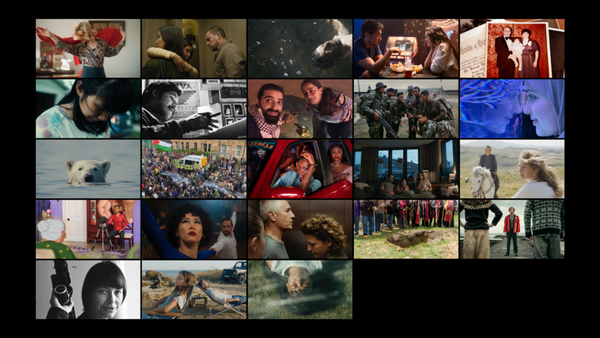In 'Him,' American Football Is a Really Big Deal, Apparently
Plus, some quick thoughts on 'The Long Walk.'

What is the price of greatness?
This is the question being asked by Justin Tipping’s film Him. In Him, Cameron Cade (Tyriq Withers) is an up-and-coming football player who’s invited to train for a week with Isaiah White (Marlon Wayans), the legendary quarterback of the San Antonio Savers. Cade is recovering from a career-altering injury but still wants to show that he has what it takes to make it in the big leagues. But as his week of trials continues, Cade starts to witness some bizarre phenomena that make him question whether this endeavor is exactly what it’s made out to be.
When I think of the phenomenon of American football and the NFL specifically, I think about Stephen Fry’s examination of the subject in his documentary series Stephen Fry in America. In the clip he visits an Iron Bowl matchup in Auburn:
As Fry himself put it:
I really don’t know if anything sums up America better. It’s simultaneously preposterous, incredibly laughable, impressive, charming, ridiculous, expensive, overpopulated, wonderful, American.
Football remains one of the most popular things in American society. In 2024, football made up 72 of the 100 most-watched broadcasts in the country. The Super Bowl is one of the only remaining monoculture events. The NFL brings in $23 billion per year in revenue.
But there’s also something deeply ugly about the whole spectacle. When we tune in each week, we’re watching players (about 50% of whom are Black) on teams largely owned by white men run into each other at incredibly high rates of speed. And while playing in the NFL can bring fame and fortune, studies show that 1 in 3 football players believe they have chronic traumatic encephalopathy. And that’s not even getting to how the league handles overtly political topics. In other words, this is an element of American culture that is ripe for critique, satire, or commentary.
In that regard, I really appreciate that Him is trying to highlight some of the costs of being an NFL superstar. You not only need to sacrifice your body, you need to surrender your mind, your free time, and your personality. You need to be willing to kill (metaphorically??), to harm, and to put winning above all other desires. Marlon Wayans is terrifying in his role as White and brings a feeling of true menace to his performance.
Where Him goes wrong is in the obviousness of its metaphor and in its narrative coherence. The movie posits a world where “What if football was actually an American religion, man?” but it’s such a thuddingly obvious metaphor that most people already refer to football that way in the real world. And while the movie starts in a relatively grounded place, it eventually goes completely off the rails to the point of being laughable. A potentially compelling story is abandoned in favor of flashy editing and impressionistic camerawork. The ending is total nonsense and, in my opinion, undercuts the seriousness and the promise of the film’s premise.
There are definitely some enjoyable elements in Him including its stylishness during its opening chapters and its two lead performances. But those hoping for an incisive critique of American football via horror film will have to wait a bit longer.
Him is out in theaters everywhere this weekend.
‘The Long Walk’ Is the Perfect Horror Film For Our Dystopian Times
In The Long Walk — Francis Lawrence’s adaptation of Stephen King’s 1979 novel — the post-war American economy is in shambles so the country’s leadership has invested in a spectacle known as The Long Walk. A young man is selected from each of the 50 states and they must walk continuously until only one is left standing. The results are televised. The winner receives a cash prize plus whatever their heart desires. Everyone who doesn’t make it is shot to death.
Why do this? For the glory of America and its economy, of course.
I was deeply moved by the film. The two leads, Ray Garraty (Cooper Hoffman) and Peter McVries (David Jonsson) have amazing chemistry, but I was equally enthralled by all the other characters and how they handled participating in this gruesome enterprise. With a cast this large, it’s difficult for any specific performance to stand out but the movie does a great job of balancing them all and giving many of them a moment to shine. The script also has a wonderful economy to it; we only get glimpses of the outside world but it’s enough to understand what the rules are and what the stakes are for each participant. It’s a subjective perspective that helps you deeply invest in each of these kids.
But mostly, it was just cathartic to see some acknowledgement of how horribly America is treating its young people. I haven’t been able to stop thinking about Scott Galloway’s recent TED talk on this subject (you can read it in essay form here):
A decent proxy for the success of a society is how it treats children. Not how individuals parent, but the success of the structures, incentives, and leadership charged with preventing a tragedy of the commons. In sum, can we answer a simple question: Do we love our children? In 2024 America, the rejoinder is disheartening.
We’ve broken the social contract that binds America: Work hard, play by the rules, and you’ll be better off than your parents were. For the first time in our nation’s history, this is no longer true. Today’s 25-year-olds make less than their parents and grandparents did at the same age, yet they carry student debt loads unimaginable to earlier generations. Neither the minimum nor median wage has kept pace with inflation or productivity gains, while housing costs have outpaced them. The statistics on children’s and young adults’ well-being are staggering.
Our society has already consigned future generations to suffering and misery. The Long Walk just makes that concept as literal as a bullet to the head.
While Stephen King’s The Long Walk was likely originally conceived as a metaphor for the Vietnam War, it has different resonance today. A system that’s ostensibly voluntary but effectively involuntary, where America is happy to subject its youth to suffering and death to further its own glory, and where the carrot of success is dangled as the prize but most people aren’t so lucky? Feels a lot like capitalism to me.
The Long Walk is out in theaters everywhere.
Other Stuff David Chen Has Made
- I’m making vlogs of all the movies I see. You can watch me discuss Him and The Long Walk below.
- For Decoding TV, I spoke with Myles McNutt about this year’s Emmy’s ceremony. Some great awards, but a truly terrible telecast!
- Also for Decoding TV, Patrick Klepek and I are continuing our coverage of Alien: Earth and Peacemaker…which is kind of a bummer because the last episodes of both shows were pretty meh. Here’s hoping the homestretch will be great.
- One more for Decoding TV: It was fun to discuss Netflix’s Unknown Number documentary with Christie Bosch (AKA @thatdocumentarygirl).
- On The Filmcast, we recently asked the question: What if someone brings a baby into the movie theater?
- [PAID ONLY] On my personal Patreon, we discuss a recent existential mini-crisis. Listen here.



